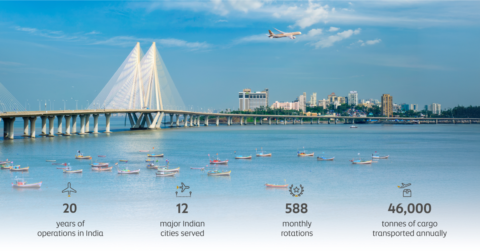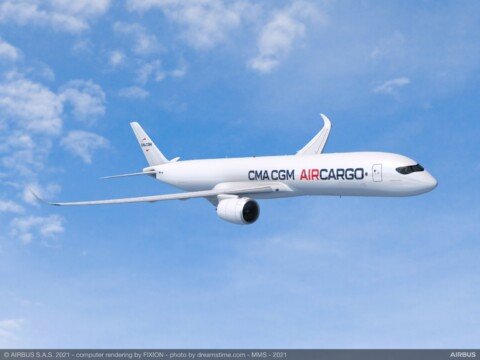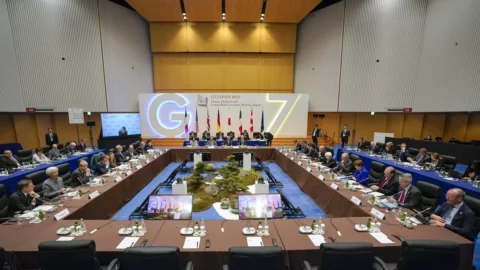April 2021 may be remembered by some as the month in which at least part of the air cargo figures returned to some kind of normality, reveals WorldACD. Although worldwide volumes were up by 53 per cent and widebody capacity by a ‘matching’ 51 per cent year-over-year (YoY), air cargo increased by a much more ‘normal’ 3 per cent when compared to April 2019. Yet, it is not unjustified to speak of a business continuing to be turned upside down, as many other measures were not even near ‘normal’.
The average rate/kg went up from an already ‘unheard of’ level of $3.12 in March to $3.30, even though it came down by 12 per cent from the crazy level of April 2020.
Widebody freighter capacity increased by 1 per cent YoY, but what to think of the changing role of widebody passenger aircraft?
They produced one-fifth of total cargo capacity in April 2020, when many passenger flights were cancelled. A year later, the figures are completely different: in April 2021, cargo capacity on w/b passenger aircraft almost tripled YoY, and comes very close to the total capacity produced on widebody freighters.

Breaking down some of our data, we see that product categories showed varying YoY-results in April. General cargo (+61 per cent), live animals (+78 per cent) and flowers (+67 per cent) did better than average, as the latter two categories also managed to further increase their rates compared to April 2020! The usual drivers of special cargo did not fulfil their role this month: vulnerable/high-tech (+30 per cent) and pharma (-3 per cent) were lagging far behind the average growth of 53 per cent realised this month, but they increased most when comparing them with April 2019. Contrary to what one may have thought, the market share of the world’s 20 largest forwarders did not change, even though three fell out of the group to be replaced by three others. Growth percentages within this group varied between 17.5 per cent and 130 per cent.
Although the question by definition cannot be answered, many people would like to find out what would have happened without COVID. Trying to make any sense of air cargo developments, calls for comparing this year with the pre-COVID-year of 2019 which leads to the following overview for the month of April:
The Americas actually gained most in air cargo exports (+8 per cent), a bit more than Asia Pacific (+7 per cent) and Europe (+1 per cent). Africa (-5 per cent) and the Middle East & South Asia (MESA, -17 per cent) were less fortunate. One level lower, we see Mexico (+14 per cent), North East Asia (+12 per cent) and USA (+10 per cent) as clear winners, whilst Australasia (-27 per cent), the Gulf Area (-22 per cent), South Asia (-19 per cent) and Southern Africa (-17 per cent) show seriously weakened positions.
Continuing this YoY comparison, the growth of express business has been most impressive (+59 per cent), shipments in excess of 5,000 kilograms increased by 32 per cent, reflecting the growing importance of charters during the COVID-period. All other so-called ‘weight breaks’ showed a volume decline. Rates are still 83 per cent up worldwide, but continue to show very large regional differences: from Asia Pacific they have more than doubled (+117 per cent), but from the Americas and Africa they increased by 30 per cent only. Judging by some daily news messages, one would think that the rate increases from China to Europe (+117 per cent) and to North America (+152 per cent) are in a class of their own. Yet, this view completely overlooks the fact that rate increases from Europe to North America were 137 per cent. A look at the 20 largest country-to-country markets shows that rates in markets other than those originating in Asia Pacific, more than doubled from Germany to USA Midwest and from Germany to USA Atlantic South. In the other Top-20 markets, rate increases were comparatively modest.

Did the world’s largest economies outside China weather the COVID storm?
Looking at the overall air cargo performance (export + import) in the first 4 months of 2021 compared to 2019, India lost 14 percent in volume, the group of G7-countries lost 1 per cent, while Brazil gained 2 per cent. In the G7, Japan was by far the most successful (+10 per cent), followed by the USA (+2 per cent). The other five G7 members (Germany, Italy, France, the UK and Canada, in that order) notched up decreases ranging from -1 per cent to -18 per cent.







